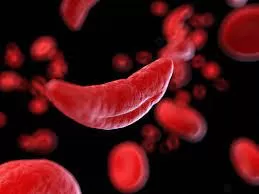Sickle cell disease (SCD) is a genetic disorder that affects millions worldwide, causing lifelong complications and suffering. This condition alters the structure of red blood cells, impairing their ability to transport oxygen efficiently. While treatments exist to alleviate symptoms, recent advancements in gene therapy offer new hope for patients.
Understanding Sickle Cell Disease
Red blood cells typically have a flexible, disc-like shape that allows them to move smoothly through blood vessels, delivering oxygen to tissues and organs. These cells contain hemoglobin, a protein responsible for oxygen transport. However, in individuals with SCD, mutations in the beta-globin gene lead to the production of an abnormal form of hemoglobin called HbS. Under stress conditions such as dehydration, infection, or low oxygen levels, HbS molecules cluster together, causing red blood cells to become rigid and take on a sickle shape.
The misshapen cells are prone to clumping, blocking blood vessels, and reducing oxygen flow to various parts of the body. This process leads to severe complications, including strokes, kidney failure, acute chest syndrome, and chronic pain crises. Additionally, the constant breakdown of sickle cells results in anemia and increased vulnerability to infections.
The Global Impact of Sickle Cell Disease
SCD disproportionately affects populations in sub-Saharan Africa, where nearly 8 million individuals live with the condition. In the UK, approximately 17,500 people are diagnosed with SCD, with around 300 new cases each year. Life expectancy for SCD patients remains significantly lower than the general population, often not exceeding 50 years in many regions.
Current Treatments and Challenges
Traditional treatments for SCD focus on managing symptoms and preventing complications. Blood transfusions provide temporary relief by increasing the number of healthy red blood cells. However, repeated transfusions can lead to iron overload and other complications.
Hydroxycarbamide, a drug initially developed for cancer treatment, has been repurposed to alleviate SCD symptoms. It works by stimulating the production of fetal hemoglobin, which does not undergo sickling. Despite its benefits, hydroxycarbamide carries risks of toxicity and is not suitable for all patients.
The only known cure for SCD has been stem cell transplantation, which replaces defective blood-forming cells with healthy ones from a donor. Unfortunately, finding a compatible donor remains a major challenge, as only about 25% of patients have a suitable match within their families.
A Breakthrough in Treatment: Gene Therapy
In 2024, the U.S. Food and Drug Administration approved two groundbreaking gene therapies for SCD—Casgevy and Lyfgenia. These therapies offer a potential lifelong solution by addressing the genetic cause of the disease.
Casgevy utilizes CRISPR-based gene editing to deactivate a gene that normally suppresses fetal hemoglobin production. By increasing fetal hemoglobin levels, the therapy compensates for the defective adult hemoglobin, reducing the occurrence of sickling.
Lyfgenia works differently by introducing a modified gene into the patient’s stem cells. This new gene prevents HbS from aggregating, thereby reducing the severity of symptoms.
Both therapies involve collecting stem cells from the patient, modifying them in a lab, and reintroducing them into the body. These treatments represent a major advancement in the fight against SCD and highlight the potential of genetic medicine in addressing inherited diseases.
Looking Ahead
Although gene therapy presents a promising future for SCD patients, accessibility and affordability remain significant challenges. Ongoing research continues to refine these therapies, ensuring they become widely available to those in need. The approval of Casgevy and Lyfgenia underscores the importance of investing in innovative treatments for genetic disorders, ultimately improving the quality of life for affected individuals.
Disclaimer: This article is for informational purposes only and should not be considered medical advice. If you or someone you know has sickle cell disease, please consult a healthcare professional for personalized medical guidance.












